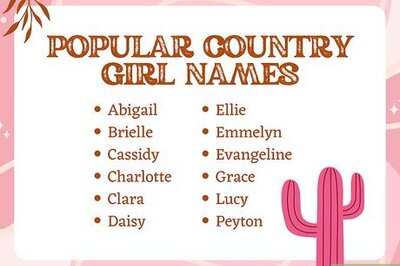
views
Seattle: Ever notice how we put forth piety as we snipe?
We say things like, "I really don't know whether this is true or not, but..." We proclaim that gossiping is a bad thing to do, even as we proceed to do it anyway.
Negative gossip surrounds us. Rumors abound. People seem to thrive on repeating stories that can hurt and harm. With each telling, the truth often becomes embellished and editorialized.
Pretty soon the tale of John leaving his office upset and in a hurry because his child was taken to the emergency room becomes John Stalks Out, Furious That Boss Argued the Point, Slamming the Door Behind Him, Not Caring About the Consequences.
Suddenly it's a headline, and people begin agreeing that "it sounds just like him, a hothead. It's probably true, and who knows who suffered in the outcome?" Pretty soon John sounds like an irresponsible person with a temper, a disaster waiting to happen, an undesirable employee.
Think about the kinds of gossip we encounter. Three levels come to mind: First, idle chatter of little consequence to anyone; second, idle chatter that is hurtful to others, although not intentionally used as such by the speaker; and third, mean-spirited, directed commentary.
When we're speculating about serious issues, we should really zip our skeptical lips.
Let's say you don't quite believe that someone's credentials are all someone claims. (A bit envious, are we?) Voicing your suspicions can cause trouble. And you will look like a fool, if you are proved wrong.
Take the high road and do not engage in the game. Nothing infuriates and frustrates a gossip more than not taking the bait. Here's how:
1. Change the topic. Precious time is on your side. That might sound like, "Listen, pals, life is too short to get entangled in this stuff. Besides, I really need to know your thoughts on...solution to...opinion of...We've got goals to meet."
2. Drift away. You don't need to say a word. Just remove yourself from the group chatting. Your silence and absence will be eloquent. You might say: "There must have been a very good reason to account for this behavior that we do not know. What I do know is that I am not willing to stand here and be a party to a story that maligns a good person."
3. Rise to the defense. Say things like: "Listen, this just doesn't sound like John." Or "That really is not the way I heard it." Then, "It's really not fair to belabor this, when John is not here to defend himself." Note: Avoid saying, "You are unfair", etc... The moment we begin a sentence with "you", communication stops while the other person builds a defense.
4. Speak the truth to the right person. When you learn that a rumor is untrue, take the person who is spreading it around aside and straighten the score. That might sound like: "I thought you would be interested to know that, as a matter of fact, John really was editor of the Harvard Law Review. So it's a good idea to stop entertaining conversations that he wasn't." Period. No lecturing, just the facts spoken in as unemotional and flat a tone as though you were saying: "It's raining outside."
5. Deflect, don't report. No good can come of repeating petty rumors to those being rumored about. It just hurts, and there's a danger that the messenger will be shot.
George Washington, first president of the United States, copied two aphorisms in his book "Rules of Civility and Decent Behaviour in Company and Conversation".
Let your conversation be without malice or envy, for it is a sign of a tractable and commendable nature; and, in all cases of passion, admit reason to govern.
His advice is simple yet far from easy.
Still, it's worth making a concerted effort to reduce - if not eliminate - the verbal toxicity in our world.
(Mary Mitchell has written several books on the subject of etiquette, including "The Complete Idiot's Guide to Etiquette" and "Class Acts." She is also the founder of executive training consultancy The Mitchell Organization with the website www.themitchell.org. The opinions expressed are her own.)



















Comments
0 comment